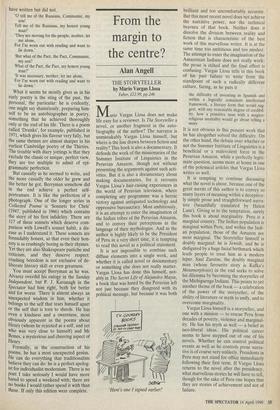From the margin to the centre?
Alan Angell
THE STORYTELLER by Mario Vargas Llosa
Faber, £12.99, pp.246
Mario Vargas Llosa does not make life easy for a reviewer. Is The Storyteller a novel, or another fragment in the auto- biography of the author? The narrator is unmistakably Vargas Llosa himself, but where is the line drawn between fiction and reality? This book is also a documentary. It defends the work of the missionaries of the Summer Institute of Linguistics in the Peruvian Amazon, though not without presenting the arguments against such acti- vities. But it is also a documentary about making documentaries, for it recounts Vargas Llosa's hair-raising experiences in the world of Peruvian television, where completing any programme was a heroic victory against antiquated technology and oppressive bureaucracy. Most ambitiously, it is an attempt to enter the imagination of the Indian tribes of the Peruvian Amazon, and to convey their perceptions in the language of their mythologies. And as the author is highly likely to be the President of Peru in a very short time, it is tempting to read this novel as a political statement.
It is not impossible to combine such diffuse elements into a single work, and whether it is called novel or documentary or something else does not really matter. Vargas Llosa has done this himself, not- ably in The Secret Life of Alejandro Mayta, a book that was hated by the Peruvian left not just because they disagreed with its political message, but because it was both
'Here's one 1 signed earlier!'
brilliant and too uncomfortably accurate.
But this most recent novel does not achieve the narrative power, nor the technical bravura of that book. Neither does it dissolve the division between reality and fiction that is characteristic of the best work of this marvellous writer. It is at the same time too ambitious and too modest. The attempt to enter the imagination of the Amazonian Indians does not really work: the prose is stilted and the final effect is confusing. Vargas Llosa tells in this book of his past failure to write from the standpoint of such a radically different culture, facing, as he puts it
the difficulty of inventing in Spanish and within a logically consistent intellectual framework, a literary form that would sug- gest, with any reasonable degree of credibil- ity, how a primitive man with a magico- religious mentality would go about telling a story.
It is not obvious in this present work that he has altogether solved the difficulty. On the other hand, the debate over whether or not the Summer Institute of Linguistics is a beneficial or a malevolent force in the Peruvian Amazon, while a perfectly legiti- mate question, seems more at home in one of the polemical articles that Vargas Llosa writes so well.
It is tempting to continue discussing what the novel is about, because one of the great merits of this author is to convey so many layers of meaning within a deceptive- ly simple prose and straightforward narra- tive (beautifully translated by Helen Lane). Giving in to the temptation, surely this book is about marginality. Peru is a marginal country. The Indian population is marginal within Peru, and within the Indi- an population, those of the Amazon are most marginal. The Storyteller himself is doubly marginal: he is Jewish, and he is disfigured by a huge facial birthmark which leads people to treat him as a modern leper. Saul Zuratas, the doubly marginal man (whose favourite story is Kafka's Metamorphosis) in the end seeks to solve his dilemma by becoming the storyteller of the Michiguenga Indians. This points to yet another theme of the book — a celebration of the power of the storyteller, of the ability of literature or myth to unify, and to overcome marginality.
Vargas Llosa himself is a storyteller, and one with a mission — to rescue Peru from decades of poverty, violence and marginal- ity. He has his myth as well — a belief in neo-liberal ideas. His political career seems to have stepped out of one of his novels. Whether he can control political events as well as he controls prose narra- tive is of course very unlikely. Presidents in Peru may not stand for office immediately following their first term. If Vargas Llosa returns to the novel after the presidency, what marvellous stories he will have to tell, though for the sake of Peru one hopes that they are stories of achievement and not of failure.


















































 Previous page
Previous page